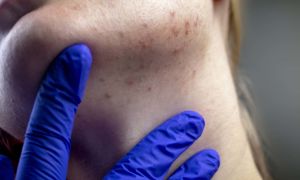Staph, short for Staphylococcus aureus bacteria, is the most common cause of the condition called folliculitis. In folliculitis, small white-headed pimples develop when bacteria infect the hair follicles. Folliculitis caused by staph is marked by itchy, white, pus-filled bumps (pimples) that can occur anywhere on the body where hair follicles grow.
Bacteria infect hair follicles when the follicles become damaged. Common causes of follicle damage include friction or irritation from shaving and acne, among others.
When the skin around follicles becomes damaged, follicles are exposed to bacteria, such as staph, that normally live harmlessly on the outside of your skin. When the bacteria get inside the damaged follicle, they multiply and cause an infection, which results in a pimple.
Continue Learning about Acne
Important: This content reflects information from various individuals and organizations and may offer alternative or opposing points of view. It should not be used for medical advice, diagnosis or treatment. As always, you should consult with your healthcare provider about your specific health needs.




